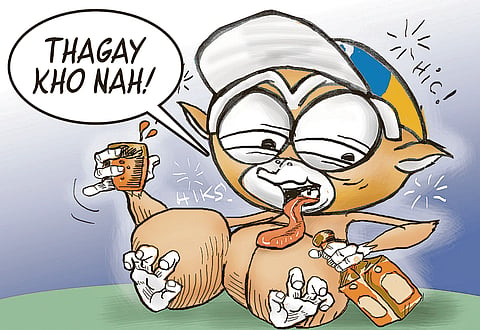
- NEWS
- the EDIT
- COMMENTARY
- BUSINESS
- LIFE
- SHOW
- ACTION
- GLOBAL GOALS
- SNAPS
- DYARYO TIRADA
- MORE

Saudi authorities are giving non-Muslim foreign diplomatic workers another way to obtain liquor in the kingdom where the sale of alcoholic beverages is banned. The government will soon open a liquor shop in the capital Riyadh that will sell alcohol to pre-registered eligible customers, according to reports.
Currently, non-Muslim consular and embassy staff import their liquor using their privileges under the diplomatic pouch. In the new alternative, envoys over 21 years old and cleared and registered to buy in the liquor shop can do so only by themselves. No proxy buying is allowed and buyers must be properly attired when entering the store, the reports say.
An authorized customer is allowed to buy a limited amount of liquor per month, measured in points. If a buyer reaches his 240-point limit, he cannot purchase more. One liter of spirits will be worth six points, one liter of wine three points and one liter of beer one point, BBC reports.
In the Philippines, the sale of alcohol is unrestricted and drinkers can consume as much as they want.
In Barangay Binicuil, Kabangkalan City, Negros Occidental, residents enjoy a free and unlimited supply of a beer-colored drink from three public taps.
Local drinking buddies Raul Iligan, Norberto Gatoc and Bordet claim that they use the brownish drink as a “chaser” whenever they indulge in their favorite gin or whisky, KMJS reports.
The three friends also claim that drinking too much of the “beer” can make one drunk, though one resident has denied this.
A barangay official explained that the drink can ignite because flammable natural gas from its source is mixed with it and is released when its bubbles burst. TV show KMJS showed a video from Raffy Sales of the flaming liquid.
Other Binicuil residents drink the beer-colored liquid because it is basically water. They also use it for cooking and mixing with milk and other substances.
Not one resident who regularly drinks the brownish water has suffered sickness or side effects. A water quality inspector told KMJS that it has no E. coli or fecal bacteria so it is clean and safe to drink.
Chemist Janir Ty Datukan, meanwhile, explained the water’s coloration. He said water may be reddish if it has a high iron and manganese concentration, and brownish when it is high in tannins or dissolved organic matter, according to KMJS.
WJG @tribunephl_wjg
